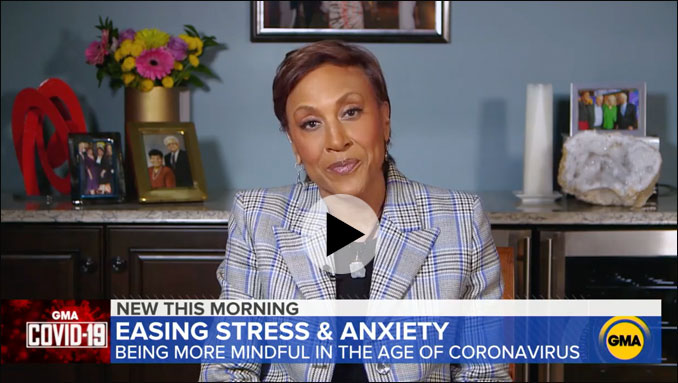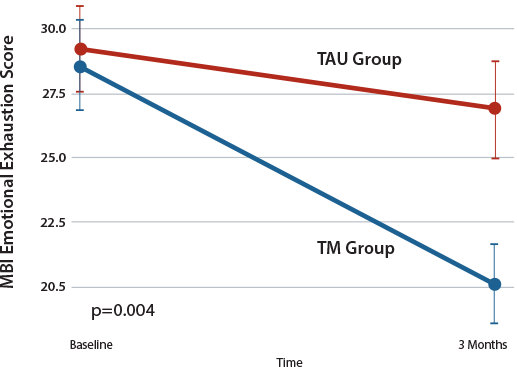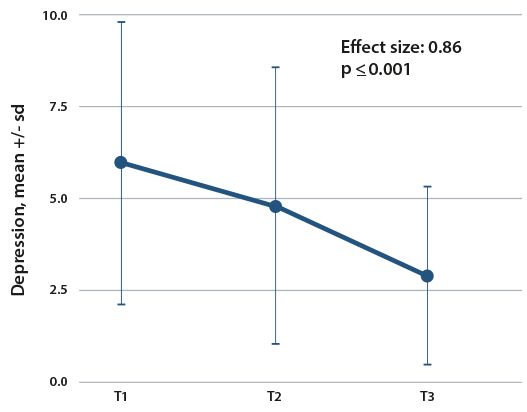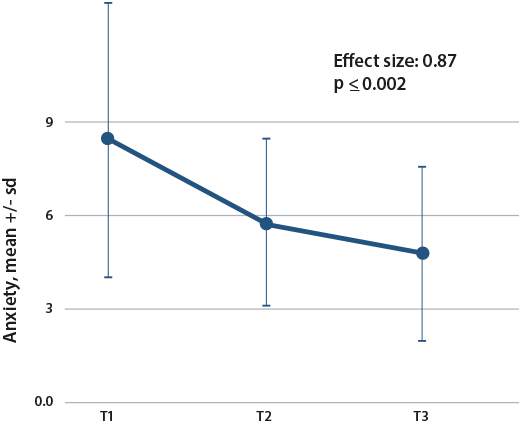Healthcare Provider Wellness Program through Transcendental Meditation
Transcendental Meditation: An Introduction
TM is an easy-to-learn, enjoyable-to-practice mental technique for deep relaxation and stress-reduction that has been successfully offered in medical schools, academic and VA medical centers, hospitals, military academies, substance abuse centers, prisons, and other settings. The TM technique is practiced for 15-20 minutes twice a day. To date, more than ten million people of all ages, nationalities, and religions have learned the technique.
TM practice produces a unique neurophysiological state that combines deep metabolic rest with heightened mental alertness. This state of deep relaxation, which researchers have termed “restful alertness,” is a potent antidote to stress. Over 400 peer-reviewed published studies on TM have documented improvements in a wide variety of stress-related disorders, as well as significant improvements in cognitive function and overall health and well-being. The National Institutes of Health and the Department of Defense have awarded over $30 million in grant support for research on TM. (See below: SELECTED STUDIES — Annotated Overview of Research on TM, Stress, Burnout, and Resilience.)
Reducing Professional Burnout and Promoting Resilience
The TM technique is an effective tool for addressing professional burnout. It has been adopted in numerous healthcare provider wellness programs as a stand-alone approach or as an adjuvant therapy to make existing programs more effective. These programs include:
- Loyola University’s Stritch School of Medicine in Chicago Medical students are offered a for-credit elective program entitled “Physician Wellness through Transcendental Meditation.” To date, more than 350 medical students have learned TM, with more students learning all the time based on positive reports. A randomized controlled trial of 42 academic faculty physicians at Loyola Stritch performed over a four-month period found significant improvements in overall burnout, depression, and insomnia in the TM group compared to controls.
- Weill Cornell Medical Center—New York Presbyterian Hospital in New York City A pilot study of physicians in the Emergency Medicine Department found significant reductions in physician burnout, insomnia, and symptoms of post-traumatic stress over a three-month period in those practicing TM.
- Norwich University in Northfield, Vermont A six-year study on cadets at America’s oldest military college (and the home of ROTC) found significant reductions in perceived stress, hypervigilance, and depression, and increases in psychological resilience in TM participants.
- Brigham and Women’s Hospital (Harvard Medical School) A pilot study of emergency medicine clinicians (physicians, nurses, and physician assistants) at the height of the Covid pandemic showed significant reductions in burnout, depression, anxiety, and perceived stress, with significantly improved quality of sleep. Compliance with at-home TM practice was high. These findings were published in the Journal of the American College of Emergency Physicians Open, Dec. 2021.
- Duke University School of Medicine A randomized controlled trial with 80 frontline healthcare workers over a 3-month period during the pandemic found significant improvements in the TM group compared to controls in burnout, anxiety, and insomnia. These findings were published in JAMA Network Open, Sept. 2022.
Three-Phase Program of TM Instruction and Follow-Up
The program is offered in partnership with affiliated institutions.
- PHASE 1: Introduction to the TM Technique (Group, on-site or remote; 60 minutes) — This session provides an introduction to the evidence-based Transcendental Meditation (TM) technique and an overview of the structure and content of the Healthcare Provider Wellness Program.
- PHASE 2: Instruction in the TM technique Four instructional sessions held over four consecutive days. (60 to 90 minutes each) — The participant is instructed by a certified TM teacher in how to meditate correctly for maximum benefit in daily life. The first session is on-site, one-on-one personal instruction. The remaining three sessions are on-site group sessions and may also be provided remotely through a digital option.
- PHASE 3: Follow-up seminars Four seminars held at intervals over a 3-month period following the course of instruction. (Group, on-site or remote; 45 minutes each) — These seminars help stabilize correct practice of the TM technique and deepen participants’ intellectual understanding of its mechanics and effects.
Alignment with NIOSH’s Total Worker Health initiative The Heal the Healers Now initiative is aligned with the Total Worker Health® initiative of the National Institute for Occupational Safety and Health (NIOSH), a component of the Center for Disease Control and Prevention (CDC), which promotes institutional policies and strategies to support workers’ wellbeing. In addition to providing the TM program, Heal the Healers Now advocates with its hospital partners for institutional policies to facilitate the adoption and success of worker wellbeing interventions, including Transcendental Meditation. Such policies would include improving the design of work, management practices, and the physical and psychosocial work environment. This may include, wherever feasible, increased flexibility in employee work schedules and protected break time on the job for wellbeing activities, including TM practice, and providing dedicated spaces for such practices. The goal is to improve how work is organized to foster and expand a culture of staff wellbeing. For further information on NIOSH and Total Worker Health strategies, visit www.cdc.gov/niosh/twh/programs/index.html.





COMMENTS FROM PHYSICIANS AND NURSES
Eric J. Nestler, MD, PhD Nash Family Professor of Neuroscience and Director of the
Friedman Brain Institute; Dean for Academic and Scientific Affairs;
Icahn School of Medicine at Mount Sinai, New York, NY
“I found TM easy to learn and practice, and it provides a wonderful sense of well-being. TM has tremendous potential for healthcare providers to reduce burnout and increase job satisfaction and productivity.”
Erica Cargill Jones, MD Clinical Associate Professor of Medicine;
Weill Cornell Medical College, New York, NY
“Nothing can erase the stress and anxiety in our lives, but meditation has taught me how to handle them better. It is important for my patients to know how much it has helped me. I recommend it to everyone to help lower blood pressure and heart rate, help with sleep, and think more clearly.”
Suzanne Steinbaum, MD CEO & Founder, Heart-Tech Health;
cardiologist; author; women's wellness advocate;
member of the David Lynch Foundation's Medical Advisory Board
“As a cardiologist, I am aware of the effects of stress on the development of heart disease. Without managing stress and other issues that drive up inflammation and plaque formation, I would not be adequately caring for my patients. TM is a tool which addresses the root of many of these issues, including stress, anxiety, depression, and unhealthy lifestyle behaviors, that lead to cardiovascular disease. I believe TM should be offered to all patients who are seeing a cardiologist, or even to those who are trying to prevent ever developing heart disease or strokes.”
Hassan A. Tetteh, MD, MBA Command Surgeon, National Defense University;
Chief Medical Informatics Officer, United States Navy;
Associate Professor of Surgery at the Uniformed Services
University of the Health Sciences; adjunct faculty at
Howard University College of Medicine; Washington, DC
“TM is proven to lower stress, high blood pressure, and depression and this can lead to improved health. With improved health, you become more effective in your relationships, at work, and in life. When you are healthy and effective in all the things you are meant to do, you move closer to realizing your real purpose in life, and this ultimately leads to happiness.”
Julie Yanitor, RN, BSN, CEN Emergency Room Nurse
Scripps Memorial Hospital, San Diego
“Transcendental Meditation is the single best thing I have ever done to improve my quality of life. Especially now, with the COVID-19 pandemic, I am not experiencing the angst that I see others experiencing around me.”
Dina Kenyon, RN, BSN Emergency Department
Penn Medicine Princeton Medical Center, Plainsboro, NJ
“I am a very grateful nurse for taking the TM course. Before TM, I had really bad insomnia, especially after working a 12-hour shift in the ED. I barely slept four hours a night. Now after practicing TM for eight months, I have no problems with insomnia, and I am now getting seven to eight hours of sleep a night. I have become more centered, energetic and calm at the same time. I am forever thankful for this opportunity.”
Tanya Malcolm, RN ER Clinical Nurse
Adventist White Oak Medical Center, Silver Spring, MD
“I love nursing, but there are so many layers of stress in taking care of the COVID-19 patients, as well as with worrying about whether I will personally catch the virus or bring it home to my family. TM has always been an anchor and a great support to me—even more so during this challenge. I am convinced that TM has made me into ‘the best me,’ and it has given me great strength and resilience in these times of despair.”
Gloria LaFollette, DNP, ARNP, FNP-C Jefferson County Health Center, Fairfield, Iowa
“As a family nurse practitioner, I have to switch gears every 15 to 30 minutes when I go in to see a new patient. TM has helped me to be more engaged with each patient, while not internalizing their problems. It has improved my ability to make quick decisions, without dwelling on it for a long time. And it has given me more energy—I am able to come home from work and still have enough patience and energy to be present with my family.”